Article not found
This article is no longer available. But don't worry—we've gathered other articles that discuss the same topic.

Votes at a glance: key bills and resolutions from the March 25 Idaho Senate session

Senate passes measure to clarify removal of unauthorized occupants from private property

Senate approves bill requiring parental notice and opt-in for certain instruction

Senate approves ban on classroom instruction of sexual orientation and gender identity for K-12

